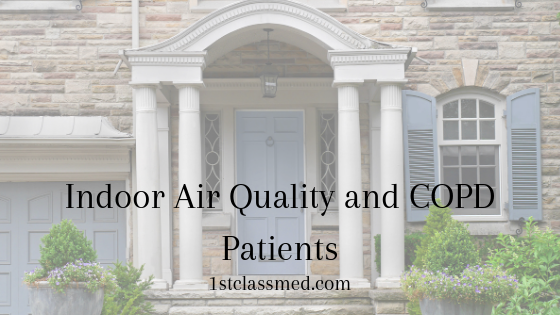
Those battling COPD can be greatly affected by air quality. There are precautions you can take when the air quality outside is bad but many don’t realize that the air inside your home is sometimes more polluted than the outdoors.
Particle Pollution
Breathing in fumes can irritate your lungs but particulates pose the greatest threat to lung patients. Particle exposure has been linked to hospitalization cases even for those without respiratory or heart conditions. The EPA defines particle pollution as a mixture of microscopic elements suspended in the air. These particulates can be either solid or liquid. They can be made up of simple soil and dust, as well as allergens, acids, metals, or organic chemicals.
The smaller the particles the greater the risk since they can penetrate more deeply into your lungs. Small particles, less than 10 micrometers, may even enter your blood stream. Larger particles are more likely to irritate your eyes, nose, and throat. As an example fine particles found in smoke or haze are roughly 2.5 mircometers or less. Dust carried by the wind can be anywhere between 2.5 and 10 micrometers.
Particulate Exposure
Both long term and short term particulate exposure can be dangerous. Symptoms 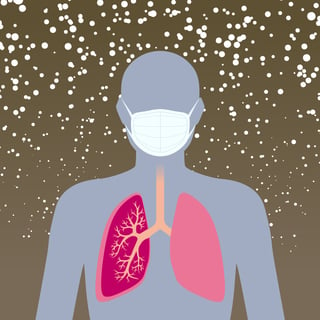 include:
include:
- Eye irritation
- Dry or itchy nose
- Raw throat
- Coughing
- Production of phlegm
- Chest tightness
- Shortness of breath
If you have a lung condition symptoms may be pronounced and wheezing and unusual fatigue may occur.
Avoiding Exposure
Plan outdoor activities when particulate levels are low.
Stay away from busy roadways.
Don't allow smoking in your home/indoors, such as candles, wood burning stoves, smoking and fireplaces.
Check your local news for air quality reports. You can also check online at AirNow.
Interpreting the Index
0-50 = Good with no advisories.
51-100 = Moderate. Those with allergy sensitivities might consider avoiding long term exposure or heavy exertion.
101-150 = Unhealthy for Sensitive Groups. Those with respiratory and heart conditions, the elderly, and very young children should limit activity and exposure.
151-200 = Unhealthy. Everyone should reduce exposure and avoid heavy exertion.
201-300= Very Unhealthy. Those in the sensitive group should stay indoors. All others should limit exposure and exertion as much as possible.
Air Purifier
Other than avoiding exposure, you can't do much about the air outside. In your home 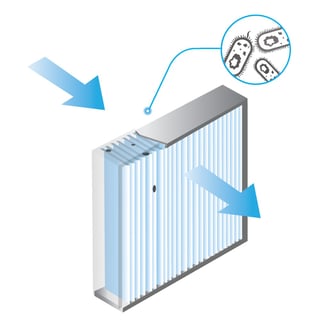 there are several steps you can take to improve air quality. Many doctors do recommend that those with advanced lung and heart conditions purchase an air purifier. There are some inexpensive ones that operate with a HEPA (High Efficiency Particulate Air) filter. These filters absorb particulates by forcing air through a fine mesh where particles become trapped. These filters can provide great allergy relief but generally only trap particles larger than .3 microns. As we've discussed there are many particulates are smaller than .25 and bacteria can be as small as .01 microns.
there are several steps you can take to improve air quality. Many doctors do recommend that those with advanced lung and heart conditions purchase an air purifier. There are some inexpensive ones that operate with a HEPA (High Efficiency Particulate Air) filter. These filters absorb particulates by forcing air through a fine mesh where particles become trapped. These filters can provide great allergy relief but generally only trap particles larger than .3 microns. As we've discussed there are many particulates are smaller than .25 and bacteria can be as small as .01 microns.
Multi-Step Purifier
For maximum effectiveness your system should have several levels to trap smaller and smaller particles.
- A pre-filter should be the first level in removing larger particulates.
- UV light exposure needs to be sufficient to prevent moisture build-up to eliminate mold and mildew.
- A membrane filter, also known as a micro-filtration unit should be present to capture those particulates that are as small as .01 microns.
- These systems cannot emit ozone as that is extremely harmful to lungs and further restricts breathing capacity.
Indoor Allergens and Particulates
Indoor Allergens can cause your immune system to react triggering an exacerbation. Most indoor allergens stem from;
- Dust mites
- Pets
- Pollen
- Household chemicals
To Help Eliminate Irritants
- Wipe surfaces often
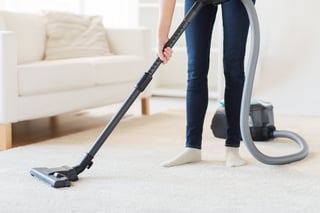
- Vacuum upholstery and carpet
- Get rid of clutter
- Keep rooms well ventilated, especially kitchen and bath
- Wash sheets and pillow cases weekly
- Keep pets brushed and clean
- Don’t allow pets on furniture (sorry, fur babies!)
- Have ducts cleaned regularly
- Don’t allow people to smoke indoors
- Reduce exposure to household chemicals and find natural alternatives instead
- Take your shoes off in the house
- Air out the house often
- Check ventilation filters regularly
Indoor Ecosystems
According to the American Society for Horticultural Studies unhealthy indoor air costs us billions of dollars annually in decreased worker productivity, medical costs, and absenteeism. Breathing ozone indoors given off by copy machines, laser printers, UV light sources and other machinery, has been linked to pulmonary edema, and reduced lung function.
Plants Filter Pollutants

Plants are a low cost and effective way to absorb ozone in offices and homes and also add beauty and charm to any indoor space. Plants and trees are air cleaners of our planet so really any will help in filtering indoor air. These are a few that have been found to be especially effective. They're also hard to kill if your thumb isn't the greenest!
Peace Lily grows in shade. They remove benzene, ammonia, trichloroethylene, and formaldehyde. They remain relatively small so are good for apartments or offices.
Boston Ferns prefer indirect sunlight and must stay moist. They are especially effective at removing xylene and formaldehyde.
Aloe Vera plants remove formaldehyde and also contain liquid anti-inflammatory substances that have wound-healing properties.
Spider Plants are some of the heartiest plants around and love bright light. They help to eliminate formaldehyde and xylene air pollution.
Garden Mums can add a little color to your environment and filter out benzine, xylene, ammonia, and formaldehyde. They can be planted both indoors and out.
Chinese Evergreen plants are extremely easy to care for and can grow in low light. They like plenty of water and an occasional misting. They filter out a variety of pollutants.
English Ivy has proven to be effective at filtering out airborne fecal matter as well as formaldehyde.
Bamboo Charcoal
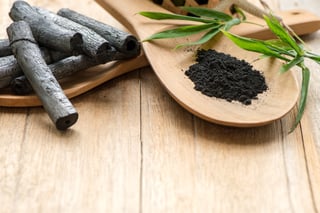 This charcoal is used in a variety of water filtration products. It has similar air filtering abilities. It filters out formaldehyde, benzene, and some of the other pollutants we have discussed. It can be purchased as a powder or in a solid piece. The powder is placed in small linen bags and can be hung in closets or other inconspicuous areas to absorb toxins. It's also a natural air freshener and can be used in the bathroom or placed in the refrigerator. Adding bamboo charcoal to your bathwater alkalizes it like water in natural hot springs. Once a month place the charcoal in sunlight for a few hours to rejuvenate it's properties.
This charcoal is used in a variety of water filtration products. It has similar air filtering abilities. It filters out formaldehyde, benzene, and some of the other pollutants we have discussed. It can be purchased as a powder or in a solid piece. The powder is placed in small linen bags and can be hung in closets or other inconspicuous areas to absorb toxins. It's also a natural air freshener and can be used in the bathroom or placed in the refrigerator. Adding bamboo charcoal to your bathwater alkalizes it like water in natural hot springs. Once a month place the charcoal in sunlight for a few hours to rejuvenate it's properties.
Himalayan Salt Lamps
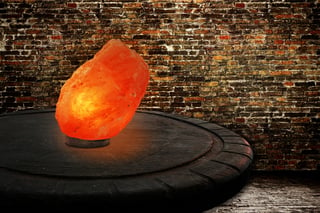
Some think that these are decor for massage studios and new age stores but they do have proven benefits. Made with salt mined in the Himalayan region, they use heat generated by an internal bulb to emit negative ions to remove toxins and allergens. These are especially beneficial for those with sleep issues as they increase serotonin and are said to increase blood flow as well.
What's in My Air?
You might be surprised at the toxic chemicals that have found their way into your home. Looking at some of these you might think, "Why would I need to filter out formaldehyde?" Because it comes in tissues and toilet paper.
Benzene can be found in commercial inks, plastics, and detergent.
Trichloroethylene is found in dry cleaning products, lacquers, and varnishes.
Xylene is used as a solvent in leather and rubber products.
These pollutants can be found in varying degrees and combinations in furniture, carpeting, cleaning products, personal items, and pretty much everything in your home.
Add some beauty to your decor with some of these natural air cleaners! Buy all natural when possible and recycle and reuse as much as possible. It will be good for your breathing and for the planet too.



